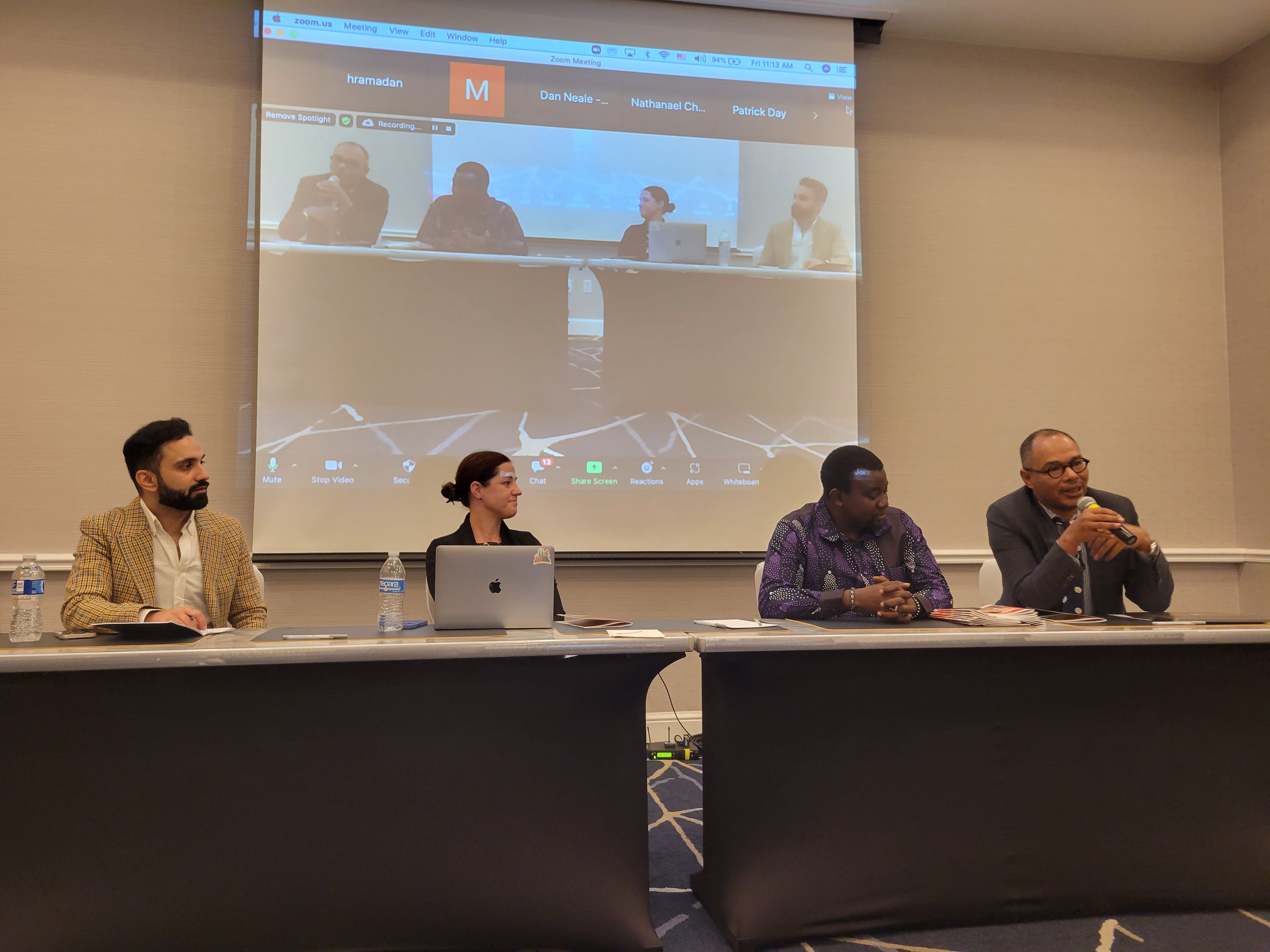
By Elizabeth Whatcott
As human rights due diligence frameworks for the ICT sector proliferate around the globe, GNI convened its Annual Learning Forum on September 27, 2022 to share tools, resources, and expertise on due diligence for the ICT industry. Entitled “Taking Due Diligence Out of the Box,” the Forum gathered GNI members, affiliates, and industry experts from around the world to discuss different dimensions of human rights due diligence and showcase the work of GNI’s members and partners in building concrete due diligence tools and recommendations for the ICT sector.

Human Rights, Risk Assessments, and Due Diligence
GNI Independent Board Chair David Kaye opened the Annual Learning Forum by setting the stage for the discussion on human rights due diligence. As more states move to regulate the tech space, he noted, increasingly companies need to engage in some form of risk assessment and due diligence work. The goal of the Forum was to examine what that risk assessment should look like, and what human rights due diligence brings to the table. This goal is especially important as the Global Network Initiative seeks to emphasize the “global” in its name and mission, expanding the scope of discussion to include tech regulation regimes across the world.
The Global Impacts of Regional Regulation: Lessons from Latin America
GNI Vice Chair Agustina Del Campo then sat down with Pedro Vaca, Inter-American Commission on Human Rights Special Rapporteur on Freedom of Expression, for a fireside chat on the Latin American perspective on tech regulations, both at a regional and global level. Vaca walked through the various trends affecting tech regulation in Latin America, including polarization, weakening democratic institutions, and the tightening of government control in certain countries. He also provided insight on the challenges Latin America faces in the regulatory space as it “imports” text and concepts from other countries and institutions in the Global North, without being part of the conversation in developing the regulation. Vaca warned against intuitive regulation, especially during crises, which can lead to inappropriate overreach and create uncertain and dangerous “gray areas” about freedom of expression.
Mapping the Information & Communication Technology Ecosystem to Identify Gaps and Opportunities
Next, GNI Managing Director Elonnai Hickok moderated a panel on mapping the ICT ecosystem and articulating what human rights due diligence looks like through the whole tech stack. Panelists for this discussion were Hannah Darnton, from Business for Social Responsibility (BSR); Marina Madale, from MTN; and Emil Linbald Kernell, from Ericsson.
Darnton dove into the toolkit “Human Rights Due Diligence across the Technology Ecosystem”, co-developed by BSR and GNI, which serves to help companies understand how questions of due diligence apply across the entire ICT ecosystem. With an ICT industry map and framework for due diligence questions that companies should ask themselves and their partners, the toolkit is especially useful in identifying how actions taken in one part of the industry can reverberate to affect other actors in the ecosystem .
Madale and Kernell provided insights on how the tool affects their respective companies, especially as it relates to relationships with other companies in the industry; what to expect from partners; and the company’s own responsibilities. The framework, they explained, helps demonstrate the common responsibility of all actors across the technology ecosystem to protect human rights, and to evolve to respond to novel challenges. As Madale explained, rights–and therefore companies’ responsibilities–evolve as technology evolves, making it doubly important for companies to understand their position, responsibilities, and impact in the ICT ecosystem.

Due Diligence Guidance for Conflict Settings
The final panel of the day discussed human rights due diligence in conflict settings, where actors face particular challenges. Usama Khilji of Bolo Bhi moderated the discussion with Gerald Pachoud, at Pluto & Associates; ‘Gbenga Sesan, at the Paradigm Initiative; and Jennifer Easterday from JustPeace Labs.
Pachoud emphasized, and Sesan and Easterday reiterated, the importance of companies preparing for a potential crisis, before one actually begins. Companies should seek meaningful stakeholder identification and engagement, as those relationships are crucial to understanding often fast-moving events and complex dynamics on the ground and cannot be built at the last minute or through rote box-checking exercises. Companies will then be better prepared to understand the context of the conflict, and the impact their actions may have upon both individual people and the context itself.
Easterday underlined the importance of broadening the scope of stakeholders that might need to be consulted, such as armed groups, diasporas, rural communities, and so forth. She also recommended that companies develop a specific enhanced due diligence framework for specific crisis scenarios ahead of time that incorporated knowledge about dynamics on the ground.
Sesan urged Forum attendees to make an effort to urge other industry actors to take human rights due diligence in conflict settings seriously, and to rebuild trust that has been lost between civil society, governments, and industry. Companies who are invested in human rights due diligence need to demonstrate that doing so has positive effects on their public perception and their bottom line.
Closing Remarks from Jason Pielmeier, GNI Executive Director
GNI Executive Director Jason Pielmeier closed the Annual Learning Forum with a recap of the day’s informative discussions, linking the day’s insights back to the larger context of improving ICT human rights practices. GNI brings together a wealth of expertise and knowledge on these issues through the Annual Learning Forum and initiatives with its members, providing collective insights on risk, engaging stakeholders, providing remedy, and mitigating harm around the world. The protests on the streets of Iran illustrate the importance of this work, as they demonstrate in real time the crucial role of the ICT sector in keeping people safe, organizing activism, protecting human rights, and allowing people to express ideas and share information. GNI looks forward to future engagement with our partners in protecting human rights online.
Watch the event recording: